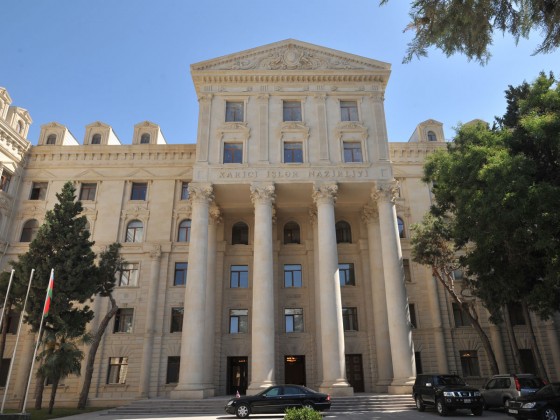
International community must strongly condemn the shelling of civilian facilities on Azerbaijani territories by Armenian army, said Hikmat Hajiyev, spokesman for Azerbaijan’s Foreign Ministry, speaking to Trend Apr. 2.
He said that shelling of civilian facilities by Armenian military is a flagrant violation of commitments undertaken by Armenia within international humanitarian law.
On the night of April 2, all the frontier positions of Azerbaijan were subjected to heavy fire from large-caliber weapons, mortars, grenade launchers and guns.
Azerbaijani settlements near the contact line, densely populated by civilians, were fired at as well. Civilians were killed and wounded as a result of the Armenian attacks.
“All the responsibility for the situation completely falls on Armenia, which is an aggressor and occupier country,” said Hajiyev. “Actions of the Armenian armed forces to escalate tensions coincide with the anniversary of the occupation of Azerbaijan’s Kalbajar district on April 2, 1993.”
He recalled that the special resolution 822 (1993) was adopted by the UN Security Council over the occupation of the Kalbajar district.
“Despite the fact that the resolutions 822 (1993), 853 (1993), 874 (1993) and 884 (1993), adopted by the UN Security Council, demand the complete and unconditional withdrawal of Armenian troops from all the occupied Azerbaijani territories, the Armenian side continues the occupation of the territories, intentional aggravation of the situation and provocative actions against civilians,” said Hajiyev.
“Azerbaijan has repeatedly stated that the presence of the Armenian armed forces in the occupied territories is a major obstacle to the settlement of the conflict, as well as the cause of deterioration of the situation and incidents,” he said.
“In order to resolve the conflict and restore lasting peace in the region, international community must in the first place strongly demand that Armenia withdraw its armed forces from all the occupied territories in line with the requirements of the four UN Security Council resolutions,” said Hajiyev.
The conflict between the two South Caucasus countries began in 1988 when Armenia made territorial claims against Azerbaijan. As a result of the ensuing war, in 1992 Armenian armed forces occupied 20 percent of Azerbaijan, including the Nagorno-Karabakh region and seven surrounding districts.
The two countries signed a ceasefire agreement in 1994. The co-chairs of the OSCE Minsk Group, Russia, France and the US are currently holding peace negotiations.
Armenia has not yet implemented the UN Security Council’s four resolutions on withdrawal of its armed forces from the Nagorno-Karabakh and the surrounding districts.
Trend
